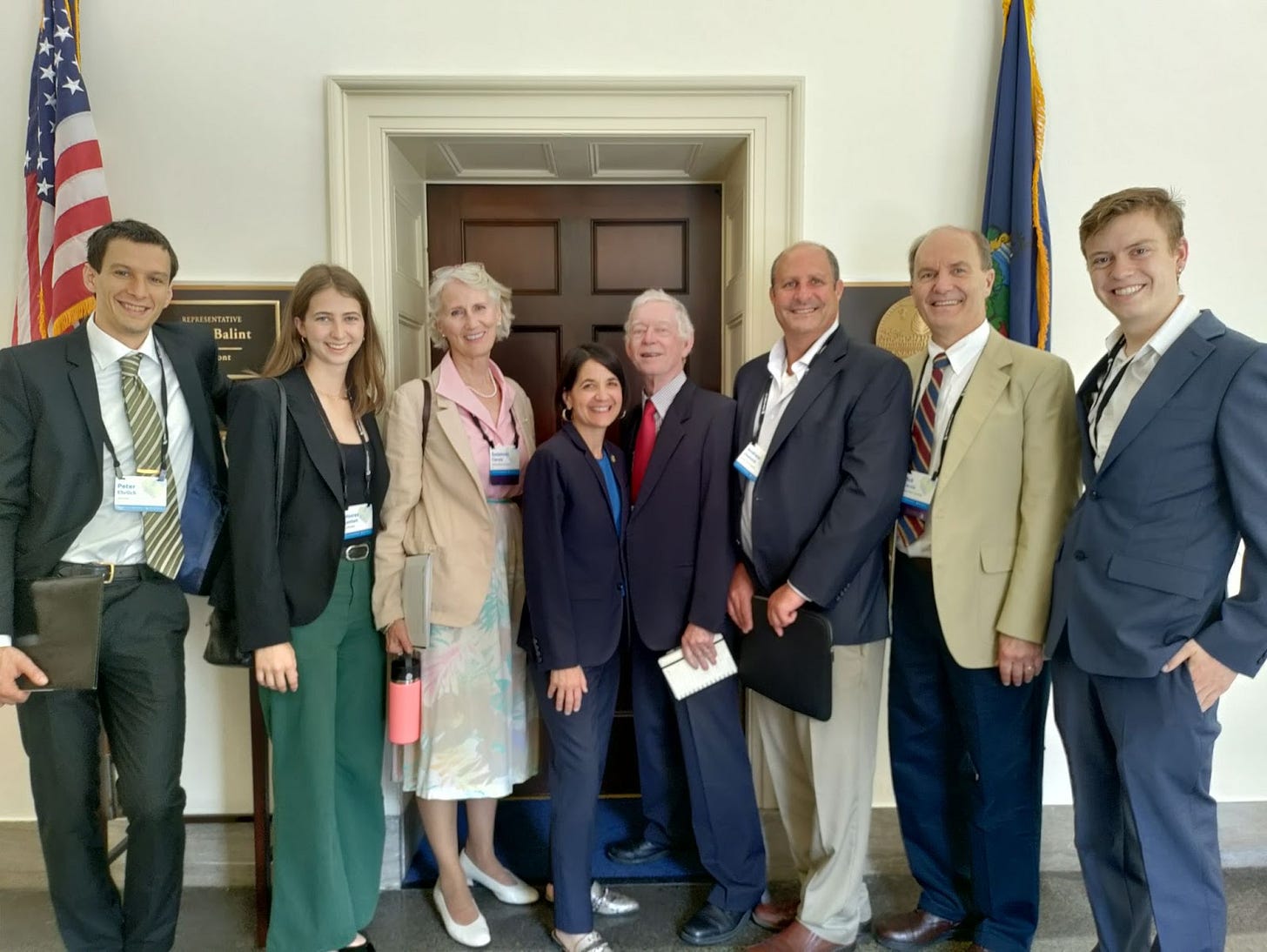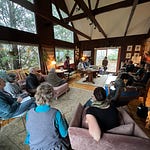Six months ago I woke up at four AM, unable to sleep due to an overabundance of worrying about emissions. That became a blog post on carbon pricing systems which taught me that there are more than sixty national & regional programs which exist in the world today.
Through writing that post I also discovered Citizens’ Climate Lobby, which exists to forward carbon pricing programs in the U.S. Their approach intrigued me for being outspokenly civilized: bi-partisan, respectful, and earnestly valuing relationships over demands.
As a CCL member, I recently made a trip to join a thousand other volunteer lobbyists on our annual visit to the offices of our Senators and House-members in Washington D.C. Until talking with congressmen myself, I couldn't fully understand why we were invited back year after year to visit with red and blue representatives alike. After participating in our democracy for the day, I feel we played some small part in moving a constructive dialog forward in our country’s national decision making body: the U.S. Congress.
Carbon Fee & Dividend
Citizens’ Climate Lobby was founded in 2007 with the goal of advocating for one simple policy: put a fee on carbon emissions at the source: be that a coal mine, an oil-well, or a port-of-entry. The funds raised will not go to the government but would be returned to citizens by a monthly check.
This is carefully designed as bi-partisan through years of work to hear concerns across the political spectrum: the price on carbon is about as free-market as can be, leaving it up to businesses to transition fuel sources in the least wasteful (and most cost-saving) way possible. At the same time, the dividends go back to the American people rather than growing the size of government programs.
There's a brilliant simplicity to the model. Of course a fee on energy stands to increase the price of all goods which are transported or grown with energy. This causes not only a push towards a clean energy transition, but also incentivizes domestic and local economies, narrowing the wealth gap. While prices rise, citizens get checks to help offset these costs. The majority of Ameicans use below-average amounts of energy: the wealthiest Americans fly and consume many times more, and can more afford the increased costs of those things. The majority of American households benefit under a Carbon Fee & Dividend.
This model has been well proven time and again. British Columbia has had a carbon tax since 2008, and has a well studied small economic gain relative to other Canadian provinces. Alaska has a similar program whereby fees from oil leases are returned to Alaskan citizens by check. New energy projects require predictable economic models in order to make large long-lead investments – such as Arkansas's investment into "green" Steel. A price on carbon protects new businesses which are developing cleaner manufacturing techniques.
Carbon Fee and Dividend is shown to be an incredibly effective climate policy. Those curious about the science behind it can start with the MIT modeled EN-Roads online simulator of global temperatures.
The EN-Roads simulator. The black line represents our current future with no policy intervention of any sort, and the blue with a price on carbon.
You may be concerned about countries without a carbon price undercutting the U.S. domestic market - and rightly so. Europe, with one of the strongest carbon prices, is solving this by introducing in 2024 a tariff on imported goods according to their "embodied" carbon, which matches their domestic carbon price.
This is already having a pronounced effect. The U.S. congress is considering its own Carbon Border Adjustment Mechanism (CBAM) in response, with some groundwork being laid out in the PROVE-IT act in the Senate.
The People of Citizens’ Climate Lobby
I find that one of the many valuable qualities a person can have is the ability to think about how the smallest details of action fit into a narrative far larger than themselves. This, in addition to compassion, drive, and empathy, is what "CCLers" have in spades.
When you think "environmentalist", you may think about someone chaining themselves to a bulldozer or throwing orange slime on a painting. You may think of someone with a blind hatred of some development, but without the ability to work constructively within a system to manifest the change they wish to see.
When you think "lobbyist", you may think about someone with two briefcases of money and a head for nothing but selfishness and greed, looking for the first representative he or she can buy. I learned a new term this weekend - congressmen call them "Lizard Lobbyists".
CCL bucks both of these ideas. Instead, CCL embodies by-the-book de-escalation, nonviolent communication, and relationship-based negotiation. The proof of success is that CCL has been welcomed into the offices of the Capitol building every year for more than the past decade.
I didn't understand why this worked until hearing second hand, and eventually first hand, about the positive reputation which precedes us to any office. Legislators are used to being cursed out by those who feel angry and wronged by lack of climate action. They are used to having their heartstrings yanked out of their chests by dying cancer patients. And they are used to being bought and sold by companies who seek power over them.
Their job is to meet with the people they represent. And when those people come in politely, interested in learning about their needs, and with an ask for a simple and well researched bi-partisan policy? It's music to their ears.
Of course, it is not always like that. There are 535 members of congress, and collectively we were only able to meet with about 80% of them. Some of those meeting requests were canceled, cut short, or ignored. But others were not. It might surprise you to learn that the Conservative Climate Solutions Caucus is the second largest conservative caucus. It might surprise you to learn that one conservative congressperson, to the lobbying team's shock and surprise, greeted them with beers, food, and a personal capitol tour.
What Works for Everyone
As someone who's almost always lived in blue-leaning areas, I was interested in what conservative folks would say about this policy, and climate change in general, in a safe and educated environment. I was certainly rewarded for my efforts, when at the start of a meeting with a conservative staffer, I was greeted with something to the effect of "Dems may not be used to this idea, but we're not a party of climate deniers".
By and large, we saw immense relief from conservatives when they saw that our policy, the Energy Innovation and Carbon Dividend Act (or EICDA for short), does not put the funds towards residential weatherization, or clean-tech research, or anything specific at all - but just back into the pockets of Americans. Given the sometimes even life-or-death effects of even marginal price increases for the many Americans living close to the poverty line, this makes a heck of a lot of sense.
We also saw a strong desire from lawmakers, especially on the right, to build up American innovation. They understand the cost of outsourcing our labor to the developing world in the name of cheap stuff, and the benefit of having our own local economy buoyed instead: our own steel making and other industries are already cleaner than the world average, and pricing for clean energy would have an immediate effect locally.
Heck, even speaking as someone who is like-as-not to be labeled as environmentalist, I would rather see battery-mineral mining happening on-shore where we can regulate the pollution caused.
"Environmentalists" Become Pro-Development
Transitioning our nation to clean energy will require substantial new infrastructure, and CCL advocates a bi-partisan approach to developing it. The clean energy sources we have to work with are solar (especially in the southern states), wind (especially offshore and on the plains), and maybe nuclear power (if we align new technology and public sentiment). That's pretty much it. Nothing new is going to appear and be scaled-up on the time-horizons at which we as a species must move.
The Federal Energy Regulatory Commission, known as FERC, has the ability to site Natural Gas and other pipelines using eminent domain, with minimal input from the states through which the pipelines are built. If that same amount of energy were transmitted electrically instead, the project could easily have an added 5-10 years of high-risk permitting negotiations. As a result, Pipelines are fast-tracked while fossil-free projects are faced with complex, often duplicative, bureaucratic delays.
Many states have ambitious clean energy goals by 2030, and the power transmission has to exist at significant scale at that point; current permitting rules make it unlikely we can reach the emissions reduction goals we have set for ourselves. David Roberts has some more detail in one of his posts.
Furthermore, research has shown that 80-90% of new projects blocked under environmental NEPA (National Environmental Policy Act) review are clean-energy ones, and calls are strong to speed up the review process to approve and deny projects more quickly.
In the halls of Congress we were chatting with one Democratic Senator when he asked us about these issues. Hearing we were for electric transmission, he broke out in a wide grin and "Where have you been all this time?"
Lobby-Day Weekend
After a certain amount of climate reading, it feels almost impossible to stomach non-essential air travel. Fortunately for us, Amtrak service in Vermont works well, and CCLers make good company on a day's train ride. Once in D.C., Sunday and Monday were spent in all manner of talks and conferences, before a Tuesday of meetings with members of Congress.
CCL did a superb job of welcoming everyone with a willingness to show up, regardless of specific climate or policy knowledge, age, &etc. Sessions ranged from how to tell a good and relatable story to role-playing on how to hold a line of listening and respect in the face of differing opinions. We heard from ex-staffers, former members of congress, retired generals, clean-energy & policy experts, non-profit directors, deans, and student leaders in an inspiring buffet of creativity, drive, and passion.
Evenings were spent in teams preparing for our meetings. Who were we meeting with? Are we meeting in-person or with staff? What have their policies been? Do they know about Carbon Fee and Dividend? What do we want to hear from them about? And what do we want to share? In all cases, we were prepared to go back and find common values if not already aligned on specific issues.
Becca Balint is a ball of energy with a drive for kids' mental health
There were seven of us from the Vermont chapter who chose to make the trip down for lobby day. Impressively, we had one highschool student and one college student who joined for the trip with just a few weeks' notice, determined to make a difference. We met with both Vermont senators and our Congresswoman, who was an absolute bundle of energy. Although each office had a different lead focus– Sanders on broad & deep climate solutions, Welch on permitting reform, and Balint on mental health, all were excited to have us back and hugely supportive of our work.
As the day drew to a close my poor introverted self could finally unwind. I left the hotel building and stood on a nearby street corner, watching the night-life of the upper-middle-class neighborhood. As I watched traffic go by, for at least a little while I did not feel the usual pit in my stomach as I watched a succession of gasoline cars roll by, and as the city exhaust smells lazily wafted towards me in the heat of the D.C. night.
I am cautiously optimistic today. Perhaps we did have some positive effect in lobbying. Just maybe we had some effect on the powers that be in helping navigate this gargantuan nation of ours through the biggest crisis of our time. I do know one thing for sure though – just by showing up, we did a hell of a lot for one another.
Legislation you can support:
Energy Innovation and Carbon Dividend Act (to be reintroduced)
Permitting reform (many bills are under discussion here, with no clear #1)
The Prove-it Act
Save our Sequoias (H.R. 2989)
P.S. There is a huge difference between a citizen lobbyist who is a U.S. citizen versus one who lives in the state or district of the Congressperson. If you think you might enjoy this sort of activity let’s not be strangers!



















Share this post